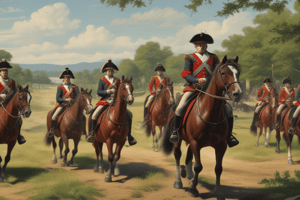Podcast
Questions and Answers
What was the primary reason the British started taxing American colonists?
What was the primary reason the British started taxing American colonists?
- To regulate trade in a mercantilist manner
- To pay back war debt (correct)
- To finance the British military
- To punish rebellious colonists
What was the outcome of the Stamp Act Congress?
What was the outcome of the Stamp Act Congress?
- Decision to boycott British goods (correct)
- Formation of the Continental Congress
- Creation of a colonial army
- Negotiation for tax reductions
How did the shift of court authority from colonial courts to British courts affect smuggling?
How did the shift of court authority from colonial courts to British courts affect smuggling?
- It increased the smuggling rate significantly
- It made smuggling trials more favorable to smugglers
- It took power away from colonial courts that were lenient (correct)
- It deterred smugglers due to stricter penalties
What did the Declaratory Act emphasize regarding British authority?
What did the Declaratory Act emphasize regarding British authority?
What was a notable reaction of merchants to the boycotts of British goods?
What was a notable reaction of merchants to the boycotts of British goods?
What was the significance of the Boston Tea Party?
What was the significance of the Boston Tea Party?
What was the Olive Branch Petition?
What was the Olive Branch Petition?
Which group of colonists were generally opposed to independence?
Which group of colonists were generally opposed to independence?
What was the primary goal of the British strategy in the American Revolution?
What was the primary goal of the British strategy in the American Revolution?
What significant outcome resulted from the French assistance to the U.S. colonists during the Revolution?
What significant outcome resulted from the French assistance to the U.S. colonists during the Revolution?
What aspect of life for colonial soldiers was notably challenging during the American Revolution?
What aspect of life for colonial soldiers was notably challenging during the American Revolution?
What did the concept of republican motherhood emphasize for the survival of the republic?
What did the concept of republican motherhood emphasize for the survival of the republic?
Which of the following best illustrates a revolutionary idea during the American Revolution?
Which of the following best illustrates a revolutionary idea during the American Revolution?
What contradiction is highlighted in the values proclaimed during the American Revolution?
What contradiction is highlighted in the values proclaimed during the American Revolution?
What major demographic change was noted by John Green as a result of the American Revolution?
What major demographic change was noted by John Green as a result of the American Revolution?
What was one of the consequences for slaves who fought for the British during the American Revolution?
What was one of the consequences for slaves who fought for the British during the American Revolution?
Flashcards are hidden until you start studying
Study Notes
Taxation and Colonial Discontent
- The British imposed taxes on American colonists due to the need to pay off war debt from conflicts such as the French and Indian War.
- New taxes targeted trade regulation through mercantilist policies rather than solely repaying war expenses.
- Colonists' grievances stemmed not from the taxes themselves but from their lack of representation in Parliament and the imposition of new taxes without consent.
- The shift of smuggling cases to British courts stripped colonial courts of leniency, escalating tensions over smuggling practices.
Initial Colonial Actions
- The Stamp Act Congress marked the first coordinated colonial response, advocating for a boycott of British goods.
- Committees of Correspondence were crucial in rallying boycotts and fostering political unity among the Thirteen Colonies.
Key Legislative Acts
- The Declaratory Act affirmed British authority to tax the colonies at will.
- The Townshend Acts established a new customs board aimed at curtailing smuggling activities.
Significant Events and Responses
- The Boston Massacre resulted in the death of five colonists during protests against British policies, heightening colonial unrest.
- The tax on tea, despite lowering prices through cheaper imports, inflamed tensions due to the perceived insult against colonial rights.
- British reaction to the Boston Tea Party included the enactment of the Intolerable Acts, aimed at punishing colonial defiance.
Early Governance and Calls for Independence
- The First Continental Congress emerged as America's initial governing body.
- Many elites in colonies like New York and Pennsylvania were hesitant about independence.
- The Olive Branch Petition sought a peaceful resolution with the King to avoid war.
Revolutionary Ideologies
- Thomas Paine's "Common Sense" articulated ideas of American exceptionalism and the necessity of independence from England for democracy.
British Military Strategy
- The British strategy aimed to capture key cities to compel colonial surrender; they successfully took Boston, New York, and Charleston, but faced determined colonial resistance.
Key Battles
- The Battle of Trenton and the Battle of Saratoga were pivotal American victories, boosting morale and support for the revolution.
Impact on Foreign Allies
- French assistance to the American colonists ultimately led to France's financial bankruptcy, which contributed to their own revolution.
Experiences of Soldiers and Enslaved Individuals
- Colonial soldiers faced harsh conditions, poor rations, and unpaid dues, with soldiers like Joseph Plumb Martin expressing feelings of neglect.
- Enslaved individuals were motivated to fight for the British, perceiving military service as a potential path to freedom.
Native American Experiences
- Native American communities suffered as American troops burned villages and enslaved captives during the conflict.
Evolving Ideologies
- Republican motherhood emerged, emphasizing women's educational roles as essential for a virtuous citizenry.
- The revolution brought forward principles of equality, challenging the confines of traditional rights and liberties.
Contradictions and Revolutionary Change
- A major contradiction was the existence of slavery amid claims of universal equality manifest in revolutionary rhetoric.
- The increase in free colored individuals in Northern America represented a significant shift towards inclusivity and debates on equality during the revolution.
Studying That Suits You
Use AI to generate personalized quizzes and flashcards to suit your learning preferences.




